The Rift Between The U.S. And Europe Gets Wider And Wider
The Trump Administration continues to drive a wedge between the United States and Europe, can it ever be repaired?
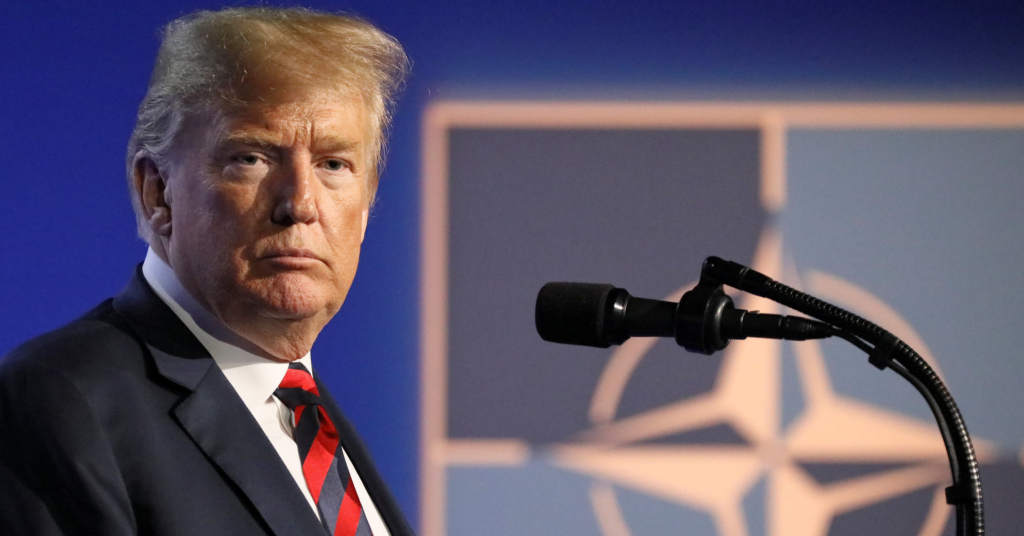
Two days after Vice-President Mike Pence lashed out at America’s European allies for not falling in line with the Trump’s Administration’s decision to back out of the Joint Comprehensive Plan Of Action (JCPOA), German Chancellor Angela Merkel rejected such calls and insisted that Europe will pursue its own route regarding the Iran nuclear deal:
Chancellor Angela Merkel of Germany delivered a strong rejoinder on Saturday to American demands that European allies pull out of the Iran nuclear deal and gave a spirited defense of multilateral institutions in a world increasingly marked by great-power rivalry.
In an uncharacteristically passionate speech, Ms. Merkel said the nuclear deal was the best way of influencing Iranian behavior on a range of non-nuclear issues, from missile development to terrorism.
Without mentioning President Trump or the United States by name in what may be her last speech to this major security conference, Ms. Merkel criticized other unilateral moves, such as Mr. Trump’s decision to pull American troops out of Syria, a suggestion that he would withdraw quickly from Afghanistan and his decision to suspend the Intermediate Range Missile Treaty with Russia, which directly affects European security.
“We sit there in the middle with the result,” she said.
Ms. Merkel spoke immediately before the United States vice president, Mike Pence, and addressed a packed auditorium with an audience that included Mr. Trump’s daughter Ivanka, as well as the Russian foreign minister and a high-ranking Chinese official, who all pointedly remained seated when the chancellor received a standing ovation.
Her reception was in sharp contrast to the polite near-silence that greeted Mr. Pence’s address. Aware of a growing anxiety among European allies that the United States administration’s erratic leadership stance was a threat to their security, the vice president came to Munich laser-focused on the Trump administration’s message.
He repeated his demand from this past week in Warsaw that Germany, France and Britain should join Washington in pulling out of the Iran nuclear deal.
“The time has come for the Europeans to leave the Iranian nuclear deal,” Mr. Pence said.
In contrast to the chancellor, Mr. Pence focused less on working together and more on a list of demands for American allies based on American interests, with a heavy emphasis on a combative approach to Iran.
“The Iranian regime openly advocates another Holocaust, and it seeks the means to achieve it,” Mr. Pence said.
The two speeches were a reminder of how far apart Europe and the United States are on a range of global issues.
Ms. Merkel said the split over Iran “depresses me very much,” but she stressed that Europe and America were ultimately pursuing the same goal since Europe, too, was concerned about Iranian behavior.
“I see the ballistic missile program, I see Iran in Yemen, and above all I see Iran in Syria,” Ms. Merkel said.
She added: “The only question that stands between us on this issue is, do we help our common cause, our common aim of containing the damaging or difficult development of Iran, by withdrawing from the one remaining agreement? Or do we help it more by keeping the small anchor we have in order maybe to exert pressure in other areas?”
Ms. Merkel defended multilateralism and stressed that collective solutions were the only way to tackle global challenges — from a rising China to climate change to mutually beneficial trade.
The chancellor also challenged the United States on its decision to pull put of Syria, asking, “Is that not also strengthening the possibilities for Iran and Russia to exert influence there?”
As Steven Erlanger and Katrin Bennhold put it in The New York Times the rift between Europe and the United States is now open and angry:,
European leaders have long been alarmed that President Trump’s words and Twitter messages could undo a trans-Atlantic alliance that had grown stronger over seven decades. They had clung to the hope that those ties would bear up under the strain.
But in the last few days of a prestigious annual security conference in Munich, the rift between Europe and the Trump administration became open, angry and concrete, diplomats and analysts say.
A senior German official, who asked not to be identified because he was not authorized to speak on such matters, shrugged his shoulders and said: “No one any longer believes that Trump cares about the views or interests of the allies. It’s broken.”
The most immediate danger, diplomats and intelligence officials warned, is that the trans-Atlantic fissures now risk being exploited by Russia and China.
Even the normally gloomy Russian foreign minister, Sergey V. Lavrov, happily noted the strains, remarking that the Euro-Atlantic relationship had become increasingly “tense.”
“We see new cracks forming, and old cracks deepening,” Mr. Lavrov said.
The Europeans no longer believe that Washington will change, not when Mr. Trump sees traditional allies as economic rivals and leadership as diktat. His distaste for multilateralism and international cooperation is a challenge to the very heart of what Europe is and needs to be in order to have an impact in the world.
But beyond the Trump administration, an increasing number of Europeans say they believe that relations with the United States will never be the same again.
Karl Kaiser, a longtime analyst of German-American relations, said, “Two years of Mr. Trump, and a majority of French and Germans now trust Russia and China more than the United States.”
Thomas Kleine-Brockhoff, a former adviser to the German president and director of the Berlin office of the German Marshall Fund, said, “If an alliance becomes unilateral and transactional, then it’s no longer an alliance.”
(…)
Vice President Mike Pence, who spoke after Ms. Merkel in Munich, met stony silence when he tried to pressure allies to withdraw from the Iran nuclear deal, a sign of the continuing anger at Washington’s decision to scrap the deal unilaterally. European allies regard the pact as vital to European security and to the preservation of nuclear nonproliferation.
Even more, the Europeans are angry that renewed American sanctions hurt European companies far more than any American ones.
Ms. Merkel said the split over Iran “depresses me very much,” but she stressed that Europe and the United States were ultimately pursuing the same goal. She said the deal was one way to have influence over Iran — influence she clearly felt that Washington was throwing away.
Mr. Pence, in his speech, praised Mr. Trump and what he called the restoration of American leadership of the West. But Europeans were not convinced.
“It’s very odd to talk of American leadership of the alliance when it’s Trump who has caused the crisis,” said Marietje Schaake, a Dutch member of the European Parliament. “The Trump administration is seen by many Europeans as chiefly responsible for the tensions and the weakening of the West.”
Nathalie Tocci, a senior adviser to the European foreign policy chief, Federica Mogherini, said that for Europeans, the divide went “to the heart of how we view international relations and our national interest.”
“We’re small and understandably need partnership both inside Europe and outside, with NATO,” Ms. Tocci said
And as Daniel Larison notes, the current rift with Europe isn’t unprecedented, we saw the same thing happen during the Iraq War:
U.S.-European relations are lower than they have been at any time since the run-up to and immediate aftermath of the 2003 U.S.-led invasion of Iraq. Just as the Bush administration berated and insulted longtime allies for refusing to fall in line behind their destructive and reckless war, the Trump administration is berating and insulting some of our closest allies over their refusal to capitulate to unreasonable American demands on Iran and the nuclear deal. Many of the elements of these two rifts are similar: an irrational American fixation on a wildly exaggerated or non-existent threat in the Middle East, an arrogant assumption that our allies are obliged to do whatever our government tells them to do, and open expressions of contempt for the allies that disagree with the course being set by the irresponsible U.S. administration. In both cases, some of our closest allies unsuccessfully try to stop the administration from making terrible, costly errors, and they are rewarded for their efforts with condemnation and threats.
(…)
If Pence really believed what he was saying, he wouldn’t be urging our allies to tear up the Joint Comprehensive Plan of Action (JCPOA). The nuclear deal has ensured that Iran cannot develop and build nuclear weapons, and anyone genuinely worried about Iran’s acquisition of such weapons would not try to destroy the agreement that makes that outcome practically impossible. The only reason to promote the lie that Iran seeks nuclear weapons is to create a pretext for war. Iran hawks hate the nuclear deal so passionately because it deprives them of that pretext. That is why they are determined to do whatever they can to kill the deal even if that means badly damaging relations with our most important treaty allies.
All of this, of course, is yet another sign of the extent to which the Trump Administration has driven a wedge between the United States and Europe, and simply another sign that is going to be difficult for the next President, whoever it is and whenever they take office, to repair the damage that this President has done in just two short years. It all began, of course, early in Trump’s Presidency with his first visit to Europe as President that left many European leaders wondering just how committed the President was to the alliance and to its collective defense principles notwithstanding later assurances regarding that commitment on his part. This concern was not out of the blue, of course, since Trump had spent much of his campaign for President attacking the NATO alliance and expressing opinions that made it seem as though he had no understanding how it really worked. In early 2016, for example, The Washington Post quoted the then-candidate as saying that the United States could no longer afford the alliance and suggested that if he were President the United States might not come to the defense of its NATO allies. In March of that year, Trump called NATO “obsolete and expensive” and suggested that its members cannot be relied on to fight terrorism. Trump repeated those comments in April 2016, said that NATO members must pay their “fair share,” and said that ”And if it breaks up NATO, it breaks up NATO.” Trump reiterated those comments again in July after winning the Republican nomination officially, something which started raising concerns in Europe notwithstanding the fact that, at the time, it did not appear that he would actually win the Presidency.
Last year, the President shifted his apparent vendetta against Europe and our closest allies from the military and foreign policy realm to the economic realm. In April 2018, for example, the President revoked the exemption from the steel and aluminum tariffs that had been announced the previous month Those exemptions applied to steel and aluminum imports from Europe as well as Canada and Mexico. In doing so, Trump claimed that he was taking this action for “national security” reasons. Objectively speaking, of course, the idea that these allies are a national security threat to the United States, or that we could not rely on them as a source for aluminum and steel in the event of a national emergency or military threat is absurd. Needless to say, this didn’t go over very well with our allies in Europe and elsewhere. Canada’s Foreign Minister called the new tariffs “absurd,” for example, and European Union officials announced retaliatory tariffs against American goods. Things got even more bizarre in this regard as Trump exchanged harsh words with Canadian Prime Minister Justin Trudeau prior to the G-7 Summit. Once he was at the summit, Trump essentially did everything he could to alienate America’s closest allies, thereby seemingly achieving a goal that Russia and, before it, the Soviet Union had only dreamed of, driving a wedge between the United States and its allies. After the Singapore Photo Op Summit, Trump continued his tirade against Trudeau, while polling revealed that Canadian public opinion about the United States was suffering as a result of American actions and the President’s rhetoric. One month later, of course, Trump met with Russian leader Vladimir Putin in Helsinki and proceeded to perform just as obsequiously as he had in Singapore during his summit with North Korean Leader Kim Jong Un. This meeting, of course, came in the wake of a NATO summit that was about as much of a disaster as you would expect it to be under Trump and a trip to the United Kingdom that didn’t go much better.
Given all of this, it’s hardly surprising that our major European allies, and even our friends to the north in Canada would begin to doubt just how much they can rely upon the United States as long as Donald Trump, or someone like him as President of the United States. In stark contrast to previous Presidents who have been careful to keep up at least the public appearance of good relationships with our allies and their leaders even when there were sharp differences of opinion behind closed doors, this President thinks nothing of throwing these allies under the bus even when there is no rational reason to do so. The result of this is that both by his rhetoric and his actions, this President has done everything possible to alienate the United States from its allies and to, as I have said before, achieve the goal that Soviet leaders from Stalin to Gorbachev could only dream about by driving a wedge between the United States and the rest of the Atlantic alliance. It appears that our ostensible allies are getting the message.
The question going forward is whether the damage that this President is doing to our relationship with Europe, NATO, and nearly all of our other allies with the exception of Israel will be reparable by the time he leaves office. To some extent, the damage will hopefully be limited in that the Europeans realize that this is likely just a temporary setback at an unusual time in American history. In that case, they will likely be willing to wait out the coming storm in the hope that whoever replaces Trump will be able and willing to repair the alliances that every President from Truman to Obama had worked so hard to build and sustain. This will be easier, of course, if Trump ends up being a one-term President. If he somehow manages to be re-elected in 2020, then the rift is likely to grow wider and Europe is likely to find itself dealing with the prospect of either having to wait another four years or to assume that the change that Trump represents is more permanent than temporary

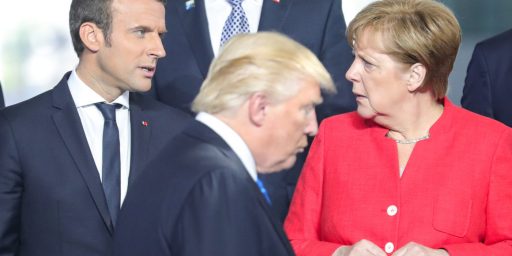
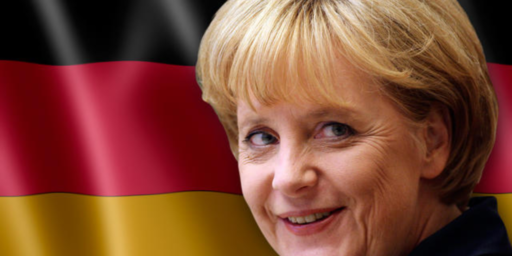
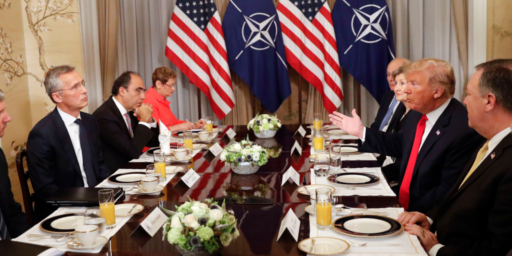
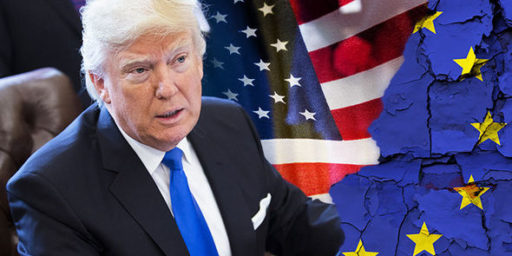
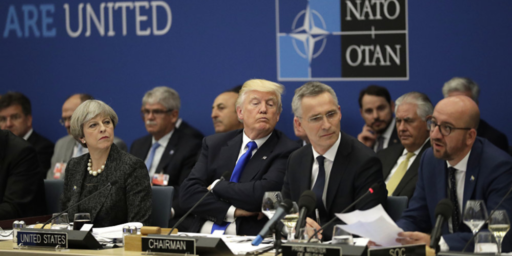
Well, what do you expect from a guy who admits he believes Putin more than his own intelligence experts?
The fundamental loss of confidence is in the American people. Voters put this buffoon in office with the worst human resources hiring decision in history. Resume One: unlikable but competent woman. Resume Two: unstable criminal moron. Everything flows from the fact that 46% of American voters cannot manage a decision that literally 100% of H.R. departments would have handled differently.
Europeans are accustomed to American hubris and belligerence. They’re used to American ignorance and recklessness. They are used to the fact that we basically know fck-all about the world beyond our borders. But the 2016 election went about ten steps further into demonstrating the incompetence of American voters. The problem is that our constitution and our international institutions are unable to defend against voter failure.
Sooner or later Trump goes away. We elect a competent president to replace him. The world breathes a sigh of relief, but now the world knows that the voters in charge of the world’s only superpower are idiots capable of all manner of destructive choices. We look ineducable. We look like what we are: a lazy, flaccid, declining democracy that has failed to educate its people about their responsibilities as citizens. And that is not going to be easy for the Europeans or anyone else to get over. We can swap presidents, but we’re still stuck with a voting base capable of catastrophic levels of stupidity.
In 2008 the whole world rejoiced. I was in Italy at that time driving a Toyota RAV with North Carolina plate and an Obama sticker on the back. Italians were thrilled. I was nearly run off the road by moped drivers swerving to give me thumb’s up. Eight years later we annihilated all that respect and good will. We went from an A+ to an F, and that is not a reassuring trajectory.
It’s not just a matter of waiting out the presidential term and hoping for a more reasonable person in the Oval, rather it’s a matter of ever trusting an American promise again.
If our word is only as good as whoever occupies the White House, then our credibility on the world stage is forever compromised.
@Michael Reynolds:
This isn’t new. As Churchill said, “You can always count on the Americans to do the right thing after they have tried everything else.”
This assumes that whoever replaces Tiny appreciates the value of our alliances since WWII. Assume for a moment that Tiny isn’t the Repug nominee in 2020, it is highly probable that whoever the nominee is will share Tiny’s nationalist, neo-isolationist worldview. On the Dem side, the only sure bet internationalist is Biden.
I’m cautiously optimistic that the alliance can be repaired, but concerned that it won’t be.
@Sleeping Dog:
Trump’s only challenger–so far–is Bill Weld. He’s about as far from Trump as one can get and still be a Republican. He also has virtually no shot at replacing Trump; he’s just the kind of Republican the Trumpkins hate: literate, well-read, educated, and civilized.
@Michael Reynolds:
While I agree with your analysis, I just have a quibble with one thing:
Actually a failed electoral system put the buffoon in office.
Having said that, I take no solace that 46 % of the voters are “useful idiots”.
The elephant in the room is the Republican party. If there were a Republican party with leaders like our hosts at OTB I would not be concerned. I may not agree with them on many aspects of policy, but they are intelligent people who want the country to succeed. Unfortunately the Republican leadership has pretty much completely abandoned any role in policy-making, and is primarily concerned with maintaining power and protecting the executive. And that does not appear to be changing anytime soon. Trump is a corrupt, racist, ignorant amoral pig, but if we had a responsible GOP he might be held in check. As long as Mitch McConnell is in control Trump can do anything and McConnell will have his back.
Does anyone in what passes for an administration these days, not understand that European leaders are not even slightly afraid of being primaried by Dennison’s base? I mean, other than Donald the Loser.
It’s obvious, too, that Trump is out to deliberately irritate and belittle the European allies. Almost as though he were acting on Putin’s orders. Consider, if it were that important to get Europe to leave the Iran deal, wouldn’t it make more sense to convince them to do so before you pull out of it?
You have to consider France, Germany and the rest were active participants in setting the deal, not passive signatories to a done treaty. You have to consider they knew what they were getting into, and what they expected to gain. You have to consider they have seen how the treaty has worked since it was implemented, so they knew whether or not they were getting what they wanted.
They’re not going to pull out just because it would be politically expedient for the ignoramus across the pond to do so, same as France and others chose not to join Bush in his major blunder in Iraq.
@CSK: The only reason that Trump won’t be the nominee is a heart attack, in which case Pence will be.
My gold rule on this is that an incumbent, eligible President will always be his party’s nominee for reelection, unless things are light years below Nixon in ‘74.
If Trump lost massive ground among Republicans, he’d still be at 60% or so, even as he (and the GOP) were down in the 20’s, and the only question was just how horribly they’d lose.
@CSK: @Barry:
This was a thought exercise where Tiny, for whatever reason is not the nominee. It could be as Barry suggested his health or a bomb dropping from Mueller or the SDNY. In that situation Weld would not be the only candidate.
@SenyorDave: Exactly! Yes, the rift can be repaired. Republicans won’t be able to do it, but that’s because for them the rift is a feature, not a bug. Remember, these are people who buy “I’d rather be Russian than Democrat” t-shirts. They have no perspective on what the things that they say and do mean and DGAF, either.
This is one area in which I partially disagree with @Michael Reynolds:. Our voters are ill informed, disengaged, and liable to ignore their own policy interests to vote based on some perceived tribal affiliation. As are European voters.
But they always have been. What’s worse now is the pervasiveness of money and pandering media.
I’m reminded of how much George W. Bush screwed things up with our country’s standing around the world and then Obama came in and fixed quite a few things…of course Trump is far worse than Bush was, but if things were mended before, they can be mended again…
On other news today:
Lawsuits against Dennison’s phony national emergency are falling down gently like snow all over America.
Nicolás Maduro, the one dictator Trump doesn’t like, intends to send humanitarian food aid to Colombia. I don’t see why Dennison doesn’t like him, they’re both exactly as indecent and depraved.
And on the lighter side, and late, the Boeing 747 “Jumbo Jet” turned 50 last week. She’s on her death bed, no question, but the Queen of the Skies has outlasted all challengers to her throne, including the A380.
To me it seems inevitable that Europe will form a military alliance to go along with the economic and political aggregation they have been developing. NATO is in the same shape as Opportunity (RIP, sweet robot), and the USA has no intention of standing in the way of Russian military power as shown by our abrogation of the INF treaty. I doubt that European leaders will be comfortable with their safety in the hands of the US as in the past, and they won’t allow themselves to be unarmed.
In the recent past, military power was help in two centers, the US and the USSR. I predict a three sided struggle in the future, US, China, and Europe. Charlemagne is being reborn.